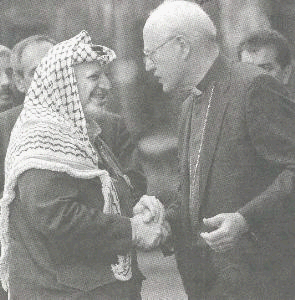|
By Jean Torkelson
The Wall Street Journal
Friday, July 13, 2001
A few hours after falling asleep,
the Rev. Elizabeth Sausele was up early, chatting with clergy, foreign
bishops and national media at a crowded Denver news conference. "I am so
filled with joy," she said. The evening before, on June 24, Ms. Sausele and
more than 1,000 worshipers had gathered at a nearby church to celebrate the
consecration of four new bishops into the Anglican Mission in America.
In less than a year the AMIA has morphed from a loose network of
conservative Episcopalians, anguished over permissive trends in the
Episcopal Church USA, to a movement claiming 8,000 members.
Though the process varies state by state, in Colorado -- which has the
most defections in the nation -- clergy from six congregations submitted
formal resignations to their Episcopal Church bishop. In each case, a
majority of members in their flocks followed them to start-up parishes in
borrowed churches and fellowship halls. In other states, departures have
ignited disputes and lawsuits.
As the Episcopal hierarchy decries the defections, AMIA members insist
that they are loyal to the true faith of the Anglican Communion, which
began five centuries ago in England and now claims 92 million members
world-wide. Indeed, they have been embraced by two conservative Anglican
provinces overseas, Rwanda and Southeast Asia, whose archbishops performed
the Denver consecrations.
Why the uproar in a church known for its stately rituals and
oh-so-English decorum? Among a litany of doctrinal concerns, AMIA members
object to the Episcopal Church's recent recognition of sexual partnerships
outside marriage and to its optional interpretations of Scripture.
By last month the new movement had rung alarms with no less than
Rev. George Carey, archbishop of Canterbury and spiritual leader of
the Church of England. The archbishop lacks canonical power over the
church's independent provinces, but he is the communion's flagship
presence. "Let me make no bones about it," he wrote to his fellow
archbishops in Southeast Asia and Rwanda: Consecration of AMIA bishops is
"at best irregular, and at worst, simply schismatic."
As canon-law experts mull the fine points of jurisdiction, the defectors
shrug off the archbishop of Canterbury's warnings. Sheltered by the
overseas provinces and based in 17 states -- including South Carolina,
where its headquarters are -- the AMIA says that it is eager to spread the
traditional Christian creed.
"I'm not an Episcopalian anymore," said Ms. Sausele, who received her
divinity degree in 1996. "I was getting exhausted dealing with the
institutional church, where we were fighting things like the authority of
scripture instead of living out the gospel."
| |
